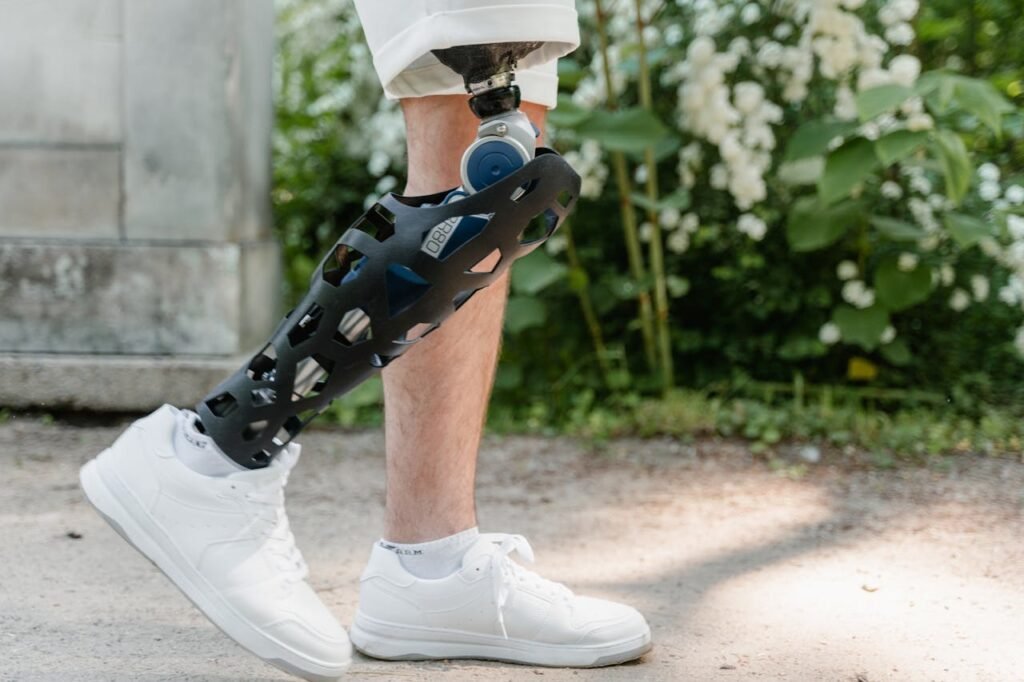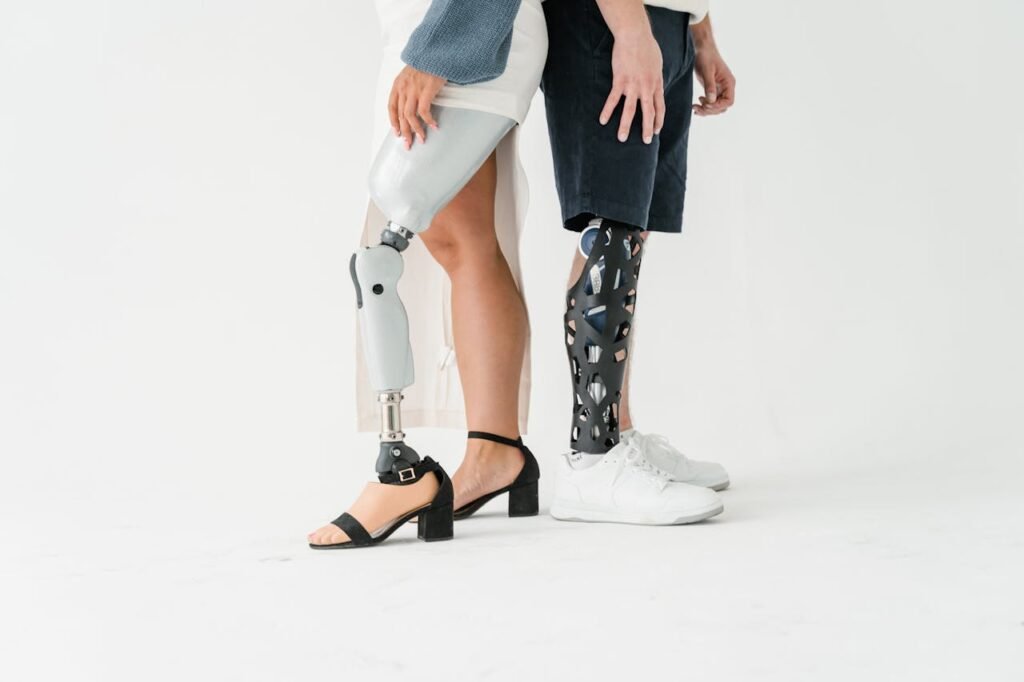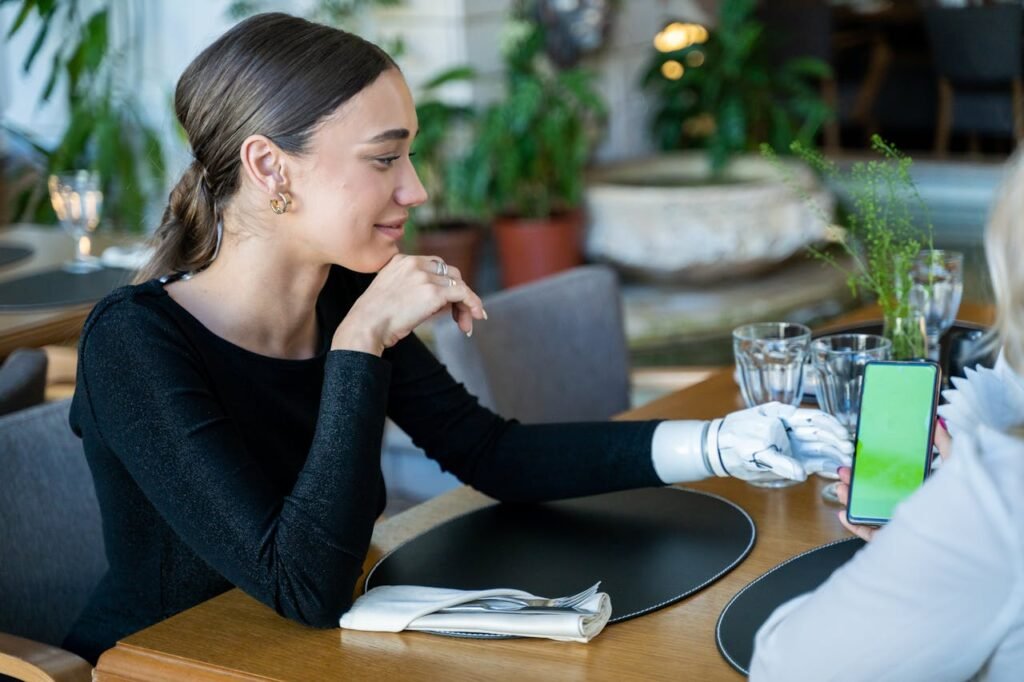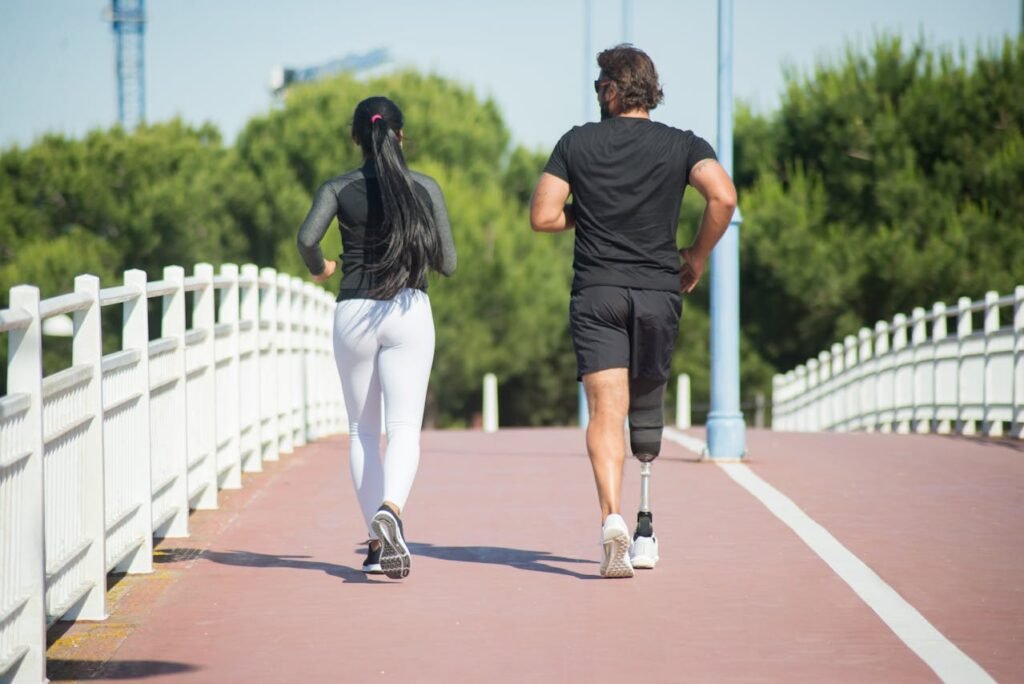Choosing a prosthetic is a big step. It is not just about technology or cost—it is about how the device feels when it becomes part of your daily life. Today, people have two main ways to explore their options: a virtual demo that happens online and an in-clinic trial that happens face-to-face. Both have value, and both come with unique challenges.
At RoboBionics, we have seen how these two approaches can shape the journey of someone choosing their first or even their second prosthetic. Some users feel more comfortable starting online, while others prefer the personal touch of an in-clinic trial. But which works better? The answer is not one-size-fits-all. It depends on your goals, your comfort, and your stage in the journey.
In this article, we will walk step by step through both experiences—what they offer, what they miss, and how you can decide which path to take. By the end, you will see not just the difference, but also how the two can work together to give you the clearest picture of what life with a prosthetic can feel like.
Understanding a Virtual Prosthetic Demo
What a Virtual Demo Really Means

A virtual prosthetic demo happens online. You connect with the prosthetic provider over a video call. Instead of wearing the device, you watch demonstrations, ask questions, and learn about its features in detail.
Why Virtual Demos Became Popular
Virtual demos became common during the pandemic, when travel was hard. They allowed people to explore options from home without stepping into a clinic. For many, this was the first safe and easy way to understand prosthetics.
The Role of Imagination
In a virtual demo, you have to imagine yourself using the device. You see how it moves, how it grips, and how the technology works. But since you are not wearing it yet, you cannot fully feel the weight, comfort, or skin response.
What You Gain from Virtual Demos
Access from Anywhere
A virtual demo removes barriers of distance. If you live in a small town far from a prosthetic center, you can still see the device and interact with experts. This makes advanced prosthetics more accessible to many people.
First-Level Understanding
The online session helps you learn what the prosthetic can do, what tasks it supports, and how it is different from other models. You gain a foundation of knowledge without needing to travel.
Confidence Before Visiting
For many users, meeting online first reduces anxiety. You can ask basic questions, clear your doubts, and feel more prepared before deciding to book an in-clinic trial.
Limitations of Virtual Demos
No Physical Feel
The biggest drawback of a virtual demo is that you cannot wear the device. Comfort, fit, and skin contact are crucial in prosthetics, and these cannot be tested through a screen.
Limited Interaction
You see the prosthetic perform, but only through the lens of the person demonstrating it. The experience is one step removed from real use. Some things—like signal response and natural movement—are impossible to judge online.
Risk of Misunderstanding
Because you rely only on visuals and explanations, you may form unrealistic expectations. What looks smooth on screen may feel different when tried in real life. That gap can sometimes cause disappointment.
Understanding an In-Clinic Trial
What Happens During a Trial
An in-clinic trial is a hands-on experience. You visit the clinic, wear the prosthetic, and try out basic tasks like holding a cup, writing, or lifting light objects. This is where you feel how the prosthetic connects to your body.
The Power of Touch and Feel
Unlike a virtual demo, here you know immediately if the socket feels too tight or if the hand feels too heavy. The trial shows you exactly how your body responds to the prosthetic in real time.
Direct Support from Experts
In the clinic, experts are by your side. They can adjust straps, explain functions, or recalibrate sensors right away. This real-time support makes the experience personal and practical.
Benefits of an In-Clinic Trial
Real Feedback from Your Body
During the trial, your skin, muscles, and energy levels speak for themselves. If there is pain or discomfort, it appears quickly. If movements feel natural, you sense it right away. No screen can replace this truth.
Trust and Confidence
Seeing yourself actually perform tasks with the prosthetic builds trust. It is one thing to watch someone else use it, and another to feel your own hand gripping an object with control.
Honest Decision-Making
Because the experience is real, your decision is more informed. You know what adjustments are needed and whether the prosthetic fits into your daily life. This makes the choice clearer and more confident.
Where Trials Fall Short
Travel and Time

Visiting a clinic requires planning. If you live far away, travel costs and time can be a barrier. Not everyone can afford to make multiple visits before deciding.
First-Time Nerves
Many people feel anxious during their first trial. Being in a new environment, surrounded by equipment, can feel intimidating. This can sometimes affect how openly you share feedback.
One Device at a Time
In most trials, you can test only one or two models. This limits your comparison, while virtual demos may allow you to see many models back-to-back.
Comparing Virtual Demos and In-Clinic Trials
The Role of Convenience
Virtual demos win when it comes to convenience. You can join from your home, without needing to travel long distances or take time off work. For many families, this is a relief. It allows them to explore options without making immediate financial or travel commitments.
In-clinic trials, however, demand effort. You may need to travel hours, arrange accommodation, or adjust your schedule. But that investment of time and energy comes with a reward—you get the real, physical experience that no virtual session can replace.
The Role of Experience
In a virtual demo, your experience is second-hand. You watch someone else wear and operate the prosthetic. You rely on the demonstrator’s movements and explanations to understand how it works. It gives you knowledge, but not lived experience.
In an in-clinic trial, the experience is yours. You move, you grip, you release. You feel the prosthetic on your skin. This gives you a connection to the device that is impossible to gain through a screen.
The Role of Emotions
Virtual demos give comfort. They feel safe, private, and pressure-free. You can ask questions without worrying about being watched as you struggle with a task. Many people find this a gentle way to begin their prosthetic journey.
In-clinic trials, on the other hand, stir strong emotions. You may feel nervous, frustrated, or even excited. These emotions are powerful because they mirror what life with the prosthetic will feel like. By living through them, you discover your readiness and resilience.
Real-Life Stories: Virtual vs In-Clinic
Story of A Virtual Start
Ramesh, a farmer living in a small town, had never seen a bionic hand in real life. Traveling to a clinic would have meant two days away from work. Instead, he joined a virtual demo. He learned how the hand worked, saw it pick up objects, and asked about price and maintenance. The session gave him enough confidence to plan a clinic visit. For him, the virtual demo was a first door opening—a way to see possibilities he had never imagined.
Story of A Trial Turning Point
Sita, a teacher, began with a virtual demo. She was impressed by what she saw, but she still doubted whether the prosthetic would suit her daily life. When she visited the clinic, she wore the hand for the first time. She tried writing on the board, holding books, and picking up chalk. The socket felt loose, and the grip was too strong. At first, she felt disappointed, but the prosthetist reassured her. Adjustments were made right then, and she tried again. This time, she could write smoothly. That moment of success gave her hope she had not felt in years.
When Both Work Together
Arjun, a college student, first attended a virtual demo to compare models. He wanted to know the differences between a mechanical and a myoelectric hand. The session gave him clarity about features. Later, he visited the clinic and tried both. The virtual demo helped him narrow his choices, while the in-clinic trial helped him make the final decision. Together, the two experiences worked perfectly for him.
Deciding Which One Works Better
If You Are Just Starting
If you are new to prosthetics and only beginning to explore, a virtual demo is a gentle entry point. It gives you information without pressure. You can learn at your own pace, ask simple questions, and prepare yourself mentally for what comes next.
If You Are Ready to Choose
If you have already learned the basics and want to know how a prosthetic will feel on your body, nothing replaces an in-clinic trial. This step is where the decision becomes real. You cannot judge fit, comfort, or response through a screen—only through experience.
If You Want Both
The best path is often a mix. Start with a virtual demo to understand the options, then follow up with an in-clinic trial to feel the reality. The two together create the clearest, most informed decision-making process.
The RoboBionics Approach
Making Virtual Demos Human

At RoboBionics, our virtual demos are not just technical presentations. We make them conversations. We show you how the prosthetic works, but we also ask about your life—what you do every day, what matters to you, what you struggle with. This helps us connect the technology to your story.
Making In-Clinic Trials Personal
When you visit us, we do more than hand you a prosthetic to try. We guide you through tasks that matter in your life. If you are a cook, we let you try holding utensils. If you are a student, we give you pens and books. We want you to see how the prosthetic fits into your world, not just in our clinic.
Deciding Together
We never tell you what to choose. We decide with you. After both virtual and in-clinic sessions, we sit down and discuss what felt right, what felt wrong, and what can be improved. This partnership is what makes the journey meaningful.
The Emotional Truth
Virtual Comfort vs Physical Reality
A virtual demo gives comfort but not full reality. An in-clinic trial gives reality but may feel overwhelming. Both have a role in preparing you for the journey.
Facing Fears Step by Step
Many people fear failure during a prosthetic trial. Starting online can ease that fear. Then, when you are ready, the in-clinic experience helps you face those fears directly and overcome them.
The Joy of the Right Choice
The true outcome of both methods is not just choosing a device, but finding joy in independence again. Whether you start virtually or in person, the goal is always the same—to give you confidence, dignity, and freedom.
Practical Dialogues for a Virtual Demo
Asking About Daily Life Use
“How does this hand handle small objects like keys or coins?”
“Can you show me how it would pick up something fragile, like a glass?”
“Is this model suitable for cooking or writing?”
These questions bring the demo closer to your world. They help you see how the prosthetic may fit into your daily routine, not just in the demonstration setting.
Clarifying Technology
“How does the prosthetic pick up signals from my muscles?”
“If the battery runs out, what happens?”
“Can the grip strength be adjusted for different tasks?”
By asking these, you gain clear understanding without technical jargon. It is important to know the basics so you feel confident moving forward.
Preparing for the Next Step
“If I want to try this in real life, how do I book a trial?”
“What adjustments are usually needed after the first trial?”
“Can I compare more than one model in the clinic?”
These dialogues ensure your virtual demo leads to action, not just information.
Practical Dialogues for an In-Clinic Trial
Sharing Your Feelings
“This part feels a bit heavy after five minutes.”
“I feel pressure on this spot of my arm.”
“The grip feels too strong for writing.”
Expressing what you feel in simple words helps the prosthetist adjust immediately. It is better to share openly than to stay silent.
Testing Real Tasks
“Can I try holding a cup of water?”
“Can I test writing my name on paper?”
“Can we try picking up something heavier, like a bag?”
These tasks reveal how the prosthetic performs in the real world. The more practical the test, the more useful the feedback.
Confirming Adjustments
“Can I try the same task again after you adjusted it?”
“Does this new grip setting last all day, or will it change?”
“If my muscles grow stronger, will we need to recalibrate?”
These questions show that you are planning ahead. They also help you understand how flexible the prosthetic will be over time.
The Journey of Combining Both
Starting with Knowledge
Virtual demos give you a foundation of knowledge. They answer your first questions, show you the possibilities, and prepare you for what comes next. This is the stage where curiosity turns into interest.
Moving Into Experience
In-clinic trials take that interest and test it against reality. You go from imagining to experiencing. You stop asking, “What can it do?” and start answering, “What can I do with it?”
Growing with Adjustments
The two experiences together give you both clarity and confidence. You see the big picture virtually, and you feel the fine details in the clinic. This combination leads to the most informed decision.
Emotional Milestones in the Process
Curiosity During Virtual Demos

In the beginning, curiosity leads. You want to know what is possible, what is affordable, and how technology has advanced. Virtual demos feed this curiosity safely.
Hope During In-Clinic Trials
When you try the prosthetic on your own arm, hope enters. Even if there are challenges, the fact that you can grip, move, and hold again awakens a sense of possibility.
Confidence After Adjustments
With repeated testing and adjustments, confidence becomes stronger. You begin to trust the prosthetic as part of your daily life. This is where independence starts to feel real.
When Virtual Works Better
For People Far From Clinics
If travel is hard or expensive, virtual demos are a gift. They allow people in remote areas to see advanced prosthetics they would otherwise never access.
For Families Gathering Information
When families want to understand the technology together, a virtual demo allows everyone to join the call. This helps in making a collective decision.
For Reducing First-Time Anxiety
Many people feel nervous about trials. Virtual demos give them time to prepare mentally before stepping into a clinic.
When In-Clinic Works Better
For Testing Real Fit
No matter how good a demo looks on screen, only wearing the prosthetic tells you the truth. In-clinic trials show how your skin, muscles, and energy respond.
For Immediate Adjustments
If something feels wrong, adjustments can be made on the spot. This makes the prosthetic feel more personal, more suited to you.
For Emotional Connection
The moment you move a hand that you once thought you lost is powerful. That emotional connection can only be felt in the clinic, not online.
Long-Term Outcomes of Virtual Demos
Building Awareness Over Time
The main outcome of a virtual demo is awareness. Even if you are not ready to choose right away, the knowledge you gain stays with you. Over weeks or months, this awareness grows into clarity about what you want.
Staying Connected With Experts
Most providers allow you to schedule follow-up calls after your first demo. This ongoing connection helps you ask new questions as they arise. Over time, it feels less like a one-time presentation and more like a relationship.
Lowering Barriers to Decision-Making
For many people, prosthetics feel like a distant dream. Virtual demos break that distance. They make advanced technology seem closer, more real, and more possible. This shift in mindset is an important long-term benefit.
Long-Term Outcomes of In-Clinic Trials
Deep Trust in the Device
The trial builds real trust. When you feel the prosthetic on your own arm, and it responds to your own signals, belief sets in. Over time, this belief becomes a foundation for everyday use.
Physical Adaptation
Your body begins to adapt during the trial. Muscles learn to send clearer signals. Skin adjusts to the socket. Each visit builds on the last, making the prosthetic feel more natural.
Emotional Strength
The in-clinic experience also strengthens you emotionally. The small victories—holding a pen, lifting a bottle, pressing a button—create a sense of progress. Over time, this emotional strength helps you embrace the prosthetic fully.
Preparing for a Virtual Demo
Setting Clear Questions
Before the call, note down what you want to know. Are you curious about battery life? Cost? Training? Writing these down helps you get clear answers during the session.
Asking to See Real Tasks
Request that the demonstrator show the prosthetic doing daily-life actions. Watching the hand hold a cup or type on a keyboard gives you practical insight beyond technical talk.
Taking Notes for Later
During the demo, write down what you see and feel. These notes become useful when you visit the clinic. They guide your comparisons and remind you of the questions you still have.
Preparing for an In-Clinic Trial
Wearing Comfortable Clothing
Choose clothes that make it easy to try the prosthetic. A short-sleeve shirt helps the fitting process and makes movement less restricted.
Bringing Everyday Items
Carry items that represent your daily life—your phone, a notebook, a key, or a small bag. Using these in the trial gives you a realistic sense of how the prosthetic fits into your world.
Speaking Up About Everything
Do not hold back during the trial. If you feel pain, if the weight feels wrong, or if you hesitate during a task, say it. Every detail you share leads to a better adjustment.
The Role of Support Systems
Family Support

Having a family member join your virtual demo or in-clinic trial can help. They see things you might miss, and they can remind you later of what the expert said.
Expert Guidance
The prosthetist is not just a technician—they are your guide. Their role is to answer, adjust, and reassure. Trust is built not only through the device but through their care.
Peer Connection
If possible, talk to others who have gone through the process. Hearing their experiences with both virtual and in-clinic steps gives you real-world perspective.
How RoboBionics Blends Both Worlds
Starting With Virtual Confidence
We begin many journeys with a virtual demo. It is an easy doorway for people across India, especially in towns and villages where clinics are far away. This first step removes fear and replaces it with curiosity.
Moving to In-Clinic Assurance
The second step is always in person. Here, curiosity turns into real confidence. We let you test, adjust, and retest until you feel secure. The focus is on comfort, not speed.
Growing Together Beyond the Trial
Even after you take the prosthetic home, our support continues. We check in virtually, schedule follow-ups, and keep listening. This balance of online and offline care ensures you never feel alone in the journey.
Which Works Better?
The Honest Answer
Neither is better on its own. Each has a purpose. Virtual demos give you vision. In-clinic trials give you truth. Together, they create the full picture.
For People Beginning the Journey
Start virtually. Learn, ask, and imagine. It is the safest and simplest way to begin.
For People Ready to Commit
Move into the clinic. Feel, test, and decide. This is the stage where dreams turn into daily reality.
Conclusion
The choice between a virtual prosthetic demo and an in-clinic trial is not a competition. It is a journey. One gives you knowledge, the other gives you experience. Together, they guide you toward the prosthetic that feels right, works right, and restores independence with dignity.
At RoboBionics, we see these two approaches as partners. We welcome you to start virtually, explore from home, and then walk into the clinic ready for the real experience. We believe in deciding together, at your pace, with your comfort at the center of every step.
Your journey is unique. Whether you start with a screen or with a fitting chair, the goal is the same: to give you back confidence, function, and freedom.
Book your demo with RoboBionics today and take the first step toward a life full of strength and possibility.



